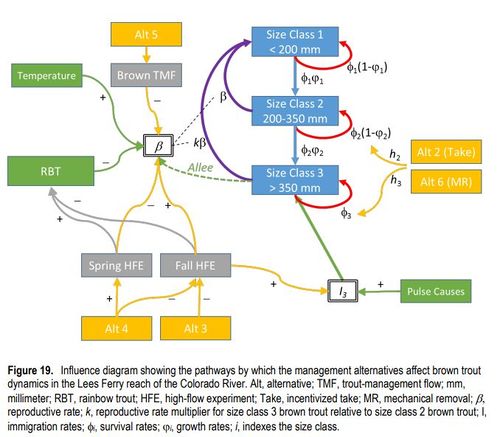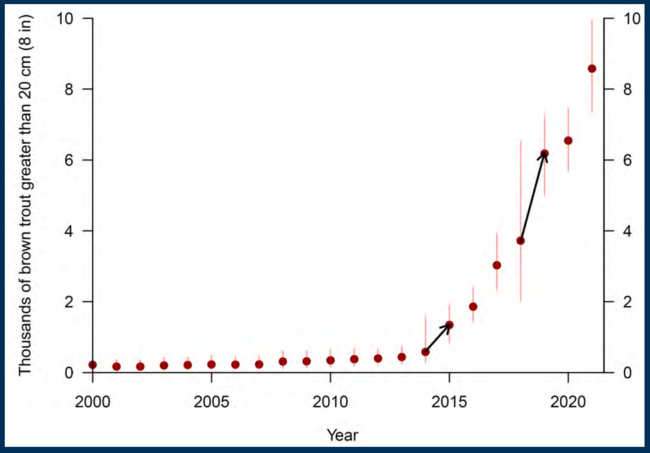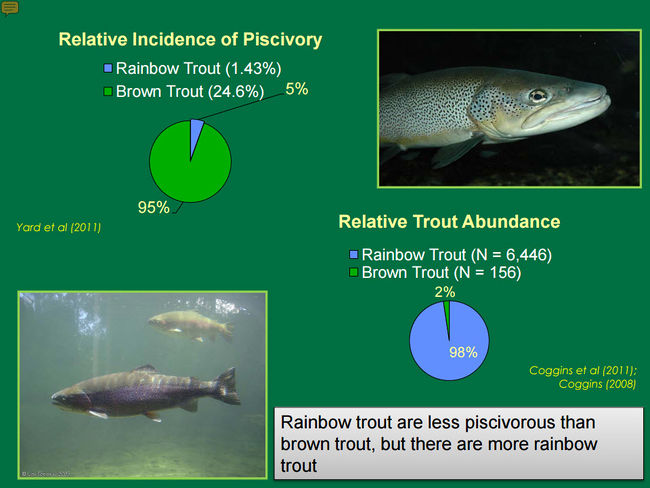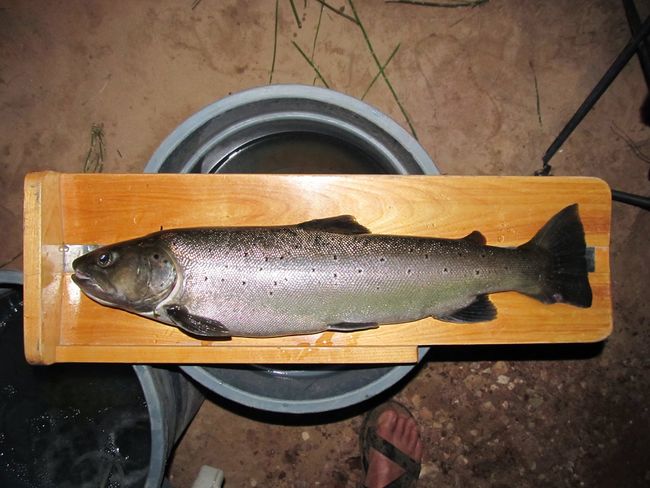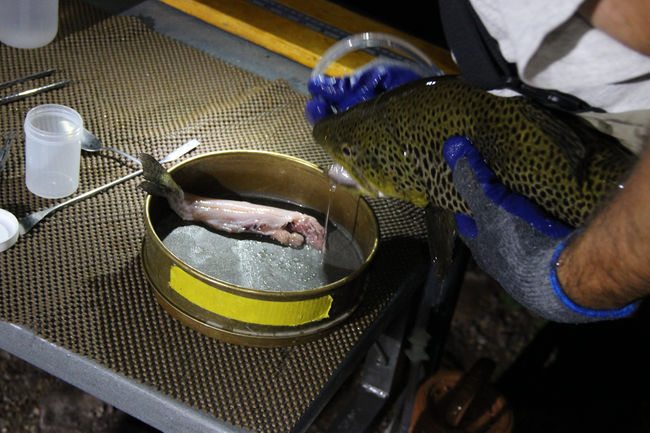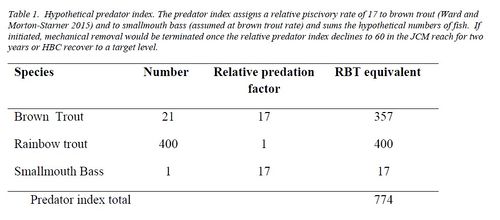Difference between revisions of "Brown Trout"
Cellsworth (Talk | contribs) |
Cellsworth (Talk | contribs) |
||
| (31 intermediate revisions by the same user not shown) | |||
| Line 15: | Line 15: | ||
</td> | </td> | ||
</tr> | </tr> | ||
| − | [[File: | + | |
| + | [[File:BrownTroutModel.JPG|thumbnail|center|500px| [https://pubs.er.usgs.gov/publication/ofr20181069 Brown trout in the Lees Ferry reach of the Colorado River—Evaluation of causal hypotheses and potential interventions] ]] | ||
| + | |||
</table> | </table> | ||
| Line 48: | Line 50: | ||
|style="color:#000;"| | |style="color:#000;"| | ||
| − | [[File: | + | [[File:BrownTrout2021.PNG|thumb|center|650px| [https://www.usbr.gov/uc/progact/amp/twg/2022-01-13-twg-meeting/20220113-AnnualReportingMeeting-FishModellingSupportManagementDecisions-508-UCRO.pdf] ]] |
| − | + | ||
| − | + | ||
| − | + | ||
| − | [[File:RBT BT piscivory.jpg|thumbnail|center| | + | [[File:RBT BT piscivory.jpg|thumbnail|center|650px|Brown trout are much more likely to eat other fish (piscivory) but since there are many more rainbow trout in the Colorado River between Glen and Marble Canyons, rainbow trout probably eat more fish numerically than brown trout.[https://pubs.er.usgs.gov/publication/70003950 https://pubs.er.usgs.gov/publication/70003950] ]] |
| + | [[File:BrownTrout LCR NO 2013.JPG|thumbnail|center|650px| Brown trout caught at the LCR during the [https://goo.gl/photos/zRQzx2eLdFB6ZsWp8 2013 summer Natal Origins trip ] ]] | ||
| − | [[File:BrownTrout FGD2016.jpg|thumbnail|center| | + | [[File:BrownTrout FGD2016.jpg|thumbnail|center|650px| An increasing brown trout population in Glen Canyon could pose a problem for both the Lees Ferry rainbow trout fishery and native fish in Grand Canyon because brown trout eat both rainbow trout and native fish alike. Above is a photo of a brown trout collected during 2016 trout monitoring below Flaming Gorge dam that had just eaten a 10" stocked rainbow trout. ]] |
|} | |} | ||
| Line 70: | Line 70: | ||
|style="color:#000;"| | |style="color:#000;"| | ||
| − | *[ | + | *[https://www.nps.gov/glca/planyourvisit/brown-trout-harvest.htm#:~:text=The%20incentivized%20harvest%20begins%20on,mouth%20of%20the%20Paria%20River. NPS Brown Trout Incentivized Harvest page ] |
*[http://gcdamp.com/index.php?title=FISHERY Lees Ferry Rainbow Trout Fishery Page] | *[http://gcdamp.com/index.php?title=FISHERY Lees Ferry Rainbow Trout Fishery Page] | ||
| − | |||
| − | |||
*[http://gcdamp.com/index.php?title=Trout_Management_Flows Trout Management Flows Page] | *[http://gcdamp.com/index.php?title=Trout_Management_Flows Trout Management Flows Page] | ||
| − | *[ | + | *[http://gcdamp.com/index.php?title=The_HFE_Page The HFE Page] |
*[http://gcdamp.com/index.php?title=Humpback_Chub_Page Humpback Chub Page] | *[http://gcdamp.com/index.php?title=Humpback_Chub_Page Humpback Chub Page] | ||
| + | *[http://gcdamp.com/index.php?title=TEMPERATURE The Temperature Page] | ||
| + | *[[GCDAMP 2016 Fish PEP| 2016 Fish Protocol Evaluation Panel (PEP)]] | ||
| + | *[http://gcdamp.com/index.php?title=National_Park_Service_Expanded_Non-native_Aquatic_Species_Management_Plan_and_EA 2019 National Park Service Expanded Non-native Aquatic Species Management Plan] | ||
*[http://gcdamp.com/index.php?title=2013_National_Park_Service_Comprehensive_Fisheries_Management_Plan 2013 National Park Service Comprehensive Fisheries Management Plan] | *[http://gcdamp.com/index.php?title=2013_National_Park_Service_Comprehensive_Fisheries_Management_Plan 2013 National Park Service Comprehensive Fisheries Management Plan] | ||
| + | |- | ||
| + | ! <h2 style="margin:0; background:#cedff2; font-size:120%; font-weight:bold; border:1px solid #a3b0bf; text-align:left; color:#000; padding:0.2em 0.4em;"> Projects </h2> | ||
| + | |- | ||
| + | |style="color:#000;"| | ||
| + | |||
| + | *[http://gcdamp.com/index.php?title=Trout_Reduction_Efforts Trout Reduction Efforts] | ||
|- | |- | ||
| − | ! <h2 style="margin:0; background:#cedff2; font-size:120%; font-weight:bold; border:1px solid #a3b0bf; text-align:left; color:#000; padding:0.2em 0.4em;">[https://www.usbr.gov/uc/rm/amp/amwg/mtgs/17sep20/index.html The Brown Trout Workshop]</h2> | + | ! <h2 style="margin:0; background:#cedff2; font-size:120%; font-weight:bold; border:1px solid #a3b0bf; text-align:left; color:#000; padding:0.2em 0.4em;">Presentations and Papers</h2> |
| + | |- | ||
| + | |style="color:#000;"| | ||
| + | |||
| + | '''2024''' | ||
| + | *[https://www.usbr.gov/uc/progact/amp/amwg/2024-02-29-amwg-meeting/20240229-FisheriesReviewAnnualReportingFY2023-508-UCRO.pdf Fisheries Review: Annual Reporting FY2023 ] | ||
| + | *[https://www.usbr.gov/uc/progact/amp/amwg/2024-02-29-amwg-meeting/20240229-AnglerResponseBrownTroutIncentivizedHarvest-508-UCRO.pdf Angler response to the Brown Trout Incentivized Harvest ] | ||
| + | *[https://www.usbr.gov/uc/progact/amp/twg/2024-01-25-twg-meeting/20240125-TWGMeeting-PopulationEffectIncentivizedHarvestBrownTrout-508-UCRO.pdf Population effect of incentivized harvest on Brown Trout ] | ||
| + | |||
| + | '''2023''' | ||
| + | *[https://www.usbr.gov/uc/progact/amp/twg/2023-11-08-twg-meeting/20231108-Effects2023SpringHFEBalancingFlowsRainbowBrownTroutGlenCanyon-508-UCRO.pdf Effects of the 2023 Spring HFE and Balancing Flows on Rainbow and Brown Trout in Glen Canyon] | ||
| + | *[https://www.usbr.gov/uc/progact/amp/twg/2023-11-08-twg-meeting/20231108-TrackingNatalOriginsBrownTroutGrandCanyonOtolithMicrochemistry-508-UCRO.pdf Tracking Natal Origins of Brown Trout In Grand Canyon Through Otolith Microchemistry ] | ||
| + | *[https://www.usbr.gov/uc/progact/amp/twg/2023-11-08-twg-meeting/20231108-BrownTroutIncentivizedHarvestProgram-508-UCRO.pdf Brown Trout - Incentivized Harvest Program ] | ||
| + | *[https://www.usbr.gov/uc/progact/amp/twg/2023-01-26-twg-meeting/20230126-AnnualReportingMeeting-WhatDoWeKnowAfterTwoYearsBrownTroutIncentivizedHarvestProgram-508-UCRO.pdf What do we know after two years of the brown trout incentivized harvest program? ] | ||
| + | *[https://www.usbr.gov/uc/progact/amp/twg/2023-01-26-twg-meeting/20230126-AnnualReportingMeeting-UpdateRainbowBrownTroutGrowthAbundanceRecruitment-508-UCRO.pdf Part I: Update on Rainbow and Brown Trout Growth, Abundance, and Recruitment in Glen Canyon (TRGD) ] | ||
| + | *[https://www.usbr.gov/uc/progact/amp/twg/2023-01-26-twg-meeting/20230126-AnnualReportingMeeting-GrandCanyonNationalParkFisheriesProgramUpdates-FY2022-508-UCRO.pdf Grand Canyon National Park Fisheries Program Updates, FY 2022] | ||
| + | |||
| + | '''2022''' | ||
| + | *[https://www.usbr.gov/uc/progact/amp/twg/2022-01-13-twg-meeting/20220113-AnnualReportingMeeting-PopulationDynamicsRainbowBrownTroutGlenCanyon508-UCRO.pdf Population Dynamics of Rainbow (Oncorhynchus mykiss) and Brown (Salmo trutta) Trout in Glen Canyon ] | ||
| + | *[https://www.usbr.gov/uc/progact/amp/twg/2022-01-13-twg-meeting/20220113-AnnualReportingMeeting-FishModellingSupportManagementDecisions-508-UCRO.pdf Fish modelling to support management decisions ] | ||
| + | *[https://www.usbr.gov/uc/progact/amp/twg/2022-01-13-twg-meeting/20220113-AnnualReportingMeeting-PreliminaryInsightsAnglerResponseBrownTroutIncentivizedHarvestProgram-508-UCRO.pdf Preliminary insights into angler response to the brown trout incentivized harvest program ] | ||
| + | |||
| + | '''2022''' | ||
| + | *[https://www.usbr.gov/uc/progact/amp/amwg/2022-02-10-amwg-meeting/20220210-FisheriesReview-AnnualReportingFY2021-508-UCRO.pdf Fisheries review: Annual Reporting FY2021 ] | ||
| + | |||
| + | '''2021''' | ||
| + | *[https://www.usbr.gov/uc/progact/amp/amwg/2021-02-11-amwg-meeting/20210211-GCDAMPAnnualReportingMeetingUpdateFishes-508-UCRO.pdf GCDAMP Annual Reporting Meeting Update: Fishes ] | ||
| + | *[https://www.usbr.gov/uc/progact/amp/twg/2021-01-22-twg-meeting/20210122-TWGMeeting-BrownTroutIncentivizedHarvestProgram-508-UCRO.pdf Brown Trout - Incentivized Harvest Program ] | ||
| + | *[https://www.usbr.gov/uc/progact/amp/twg/2021-01-22-twg-meeting/20210122-AnnualReportingMeeting-BrownTroutPopulationModeling-508-UCRO.pdf Brown Trout Population Modeling ] | ||
| + | |||
| + | '''2020''' | ||
| + | *Incentivized Harvest Program Implementation Update – contact Ken Hyde, NPS | ||
| + | *[https://www.usbr.gov/uc/progact/amp/twg/2020-01-13-twg-meeting/20200113-AnnualReportingMeeting-TroutRecruitmentGrowthPopulationDynamics-Presentation-508-UCRO.pdf TRGD: Trout Recruitment, Growth and Population Dynamics ] | ||
| + | |||
| + | '''2018''' | ||
| + | *[https://doi.org/10.3133/ofr20181069 Runge et al., 2018, Brown trout in the Lees Ferry reach of the Colorado River—Evaluation of causal hypotheses and potential interventions: USGS Open-File Report] | ||
| + | *[https://www.usbr.gov/uc/progact/amp/amwg/2018-02-14-amwg-meeting/Attach_02.pdf Brown Trout in Lees Ferry: Evaluation of Causal Hypotheses and Potential Interventions PPT] | ||
| + | *[https://www.usbr.gov/uc/progact/amp/twg/2018-01-25-twg-meeting/AR16.pdf Brown Trout Telemetry at Lees Ferry and Grand Canyon, Arizona PPT] | ||
| + | *[https://www.usbr.gov/uc/progact/amp/twg/2018-01-25-twg-meeting/Attach_06.pdf Brown Trout in Lees Ferry: Evaluation of Causal Hypotheses and Potential Interventions ] | ||
| + | |||
| + | '''2017''' | ||
| + | *[https://www.usbr.gov/uc/progact/amp/amwg/2017-02-15-amwg-meeting/Attach_04.pdf Lees Ferry Trout Fishery Status ] | ||
| + | *[https://www.usbr.gov/uc/progact/amp/twg/2017-01-26-twg-meeting/AR23_Muehlbauer.pdf Brown Trout in Glen Canyon: Insights from Two Expert Elicitation Surveys ] | ||
| + | *[https://www.usbr.gov/uc/progact/amp/twg/2017-01-26-twg-meeting/AR22_Healy.pdf Bright Angel Brown Trout Removal and Humpback Chub Translocations ] | ||
| + | *[https://www.usbr.gov/uc/progact/amp/twg/2017-01-26-twg-meeting/A10_Healy.pdf Brown Trout Management Considerations: An Update ] | ||
| + | *[https://www.usbr.gov/uc/progact/amp/twg/2017-01-26-twg-meeting/AR21_Rogowski.pdf System Wide Monitoring ] | ||
| + | |||
| + | '''2016''' | ||
| + | *[https://www.usbr.gov/uc/progact/amp/amwg/2016-08-24-amwg-meeting/Attach_07a.pdf Grand Canyon Monitoring and Research Center Science Updates (BO Compliance, Trout Updates, Green Sunfish, Fisheries PEP, Partners in Science)] | ||
| + | *[https://www.usbr.gov/uc/progact/amp/twg/2016-02-26-twg-meeting/Attach_06.pdf Brown Trout Update Lees Ferry] | ||
| + | *[https://www.usbr.gov/uc/progact/amp/twg/2016-02-26-twg-meeting/AR21_Nelson.pdf Bright Angel Creek Non-Native Trout Reduction, Grand Canyon National Park] | ||
| + | |||
| + | '''2015''' | ||
| + | *[[Media:Dibble et al. 2015 Ecological Applications3.pdf| Dibble et al. 2015. Flow management and fish density regulate salmonid recruitment and adult size in tailwaters across western North America ]] | ||
| + | |||
| + | '''2014''' | ||
| + | *[[Media:Whiting et al. 2016 GCtroutDiets.pdf| Whiting et al. 2014. Macroinvertebrate prey availability and food web dynamics of nonnative trout in a Colorado River tributary, Grand Canyon. Freshwater Science.]] | ||
| + | |||
| + | '''2013''' | ||
| + | *[https://www.usbr.gov/uc/progact/amp/amwg/2013-08-08-amwg-meeting/Attach_08.pdf Science Update: Fisheries] | ||
| + | *[https://www.usbr.gov/uc/progact/amp/twg/2013-01-24-twg-meeting/8_Healy.pdf Diets and Food Availability of Nonnative Trout in Bright Angel Creek, Grand Canyon: Implications for Native Fish Conservation] | ||
| + | *[https://www.usbr.gov/uc/progact/amp/twg/2013-01-24-twg-meeting/13_Healy.pdf Nonnative fish control in GCNP tributaries] | ||
| + | |||
| + | '''2011''' | ||
| + | *[https://www.gcmrc.gov/files/2584/w-2584_2011-04-27-17-23-03-624_Trout%20Piscivory%20in%20the%20CR%20GC_Yard.pdf Yard et al. 2011 Trout piscivory in the Colorado River, Grand Canyon: Effects of turbidity, temperature, and fish prey availability. Transactions of the American Fisheries Society] | ||
| + | |||
| + | |- | ||
| + | ! <h2 style="margin:0; background:#cedff2; font-size:120%; font-weight:bold; border:1px solid #a3b0bf; text-align:left; color:#000; padding:0.2em 0.4em;">[https://www.usbr.gov/uc/rm/amp/amwg/mtgs/17sep20/index.html The 2017 Brown Trout Workshop]</h2> | ||
|- | |- | ||
|style="color:#000;"| | |style="color:#000;"| | ||
| − | *[https://www.usbr.gov/uc/ | + | *[https://doi.org/10.3133/ofr20181069 Runge et al., 2018, Brown trout in the Lees Ferry reach of the Colorado River—Evaluation of causal hypotheses and potential interventions: USGS Open-File Report] |
| − | *[https://www.usbr.gov/uc/ | + | *[https://www.usbr.gov/uc/progact/amp/amwg/2017-09-20-amwg-meeting/BT01.pdf Brown Trout Workshop Agenda] |
| − | *[https://www.usbr.gov/uc/ | + | *[https://www.usbr.gov/uc/progact/amp/amwg/2017-09-20-amwg-meeting/Workshop_Notes.pdf Brown Trout Workshop Notes] |
| − | *[https://www.usbr.gov/uc/ | + | *[https://www.usbr.gov/uc/progact/amp/amwg/2017-09-20-amwg-meeting/BT03.pdf Brown Trout Below Glen Canyon Dam: A Preliminary Analysis of Risks and Options White Paper] |
| − | *[https://www.usbr.gov/uc/ | + | *[https://www.usbr.gov/uc/progact/amp/amwg/2017-09-20-amwg-meeting/BT04.pdf Brown Trout Workshop Overview] |
| − | *[https://www.usbr.gov/uc/ | + | *[https://www.usbr.gov/uc/progact/amp/amwg/2017-09-20-amwg-meeting/BT05.pdf Pueblo of Zuni Perspectives on Fish Research and Management] |
| − | *[https://www.usbr.gov/uc/ | + | *[https://www.usbr.gov/uc/progact/amp/amwg/2017-09-20-amwg-meeting/BT06.pdf Context and Objectives] |
| − | *[https://www.usbr.gov/uc/ | + | *[https://www.usbr.gov/uc/progact/amp/amwg/2017-09-20-amwg-meeting/BT07.pdf Scientific Background] |
| − | *[https://www.usbr.gov/uc/ | + | *[https://www.usbr.gov/uc/progact/amp/amwg/2017-09-20-amwg-meeting/BT08.pdf Preliminary Review of Bright Angel Creek Trout Control Operations] |
| − | *[https://www.usbr.gov/uc/ | + | *[https://www.usbr.gov/uc/progact/amp/amwg/2017-09-20-amwg-meeting/BT09.pdf Root Causes for the Increase in Brown Trout in Lees Ferry Reach] |
| − | *[https://www.usbr.gov/uc/ | + | *[https://www.usbr.gov/uc/progact/amp/amwg/2017-09-20-amwg-meeting/BT10.pdf Risks, Current and Potential] |
| − | *[https://www.usbr.gov/uc/ | + | *[https://www.usbr.gov/uc/progact/amp/amwg/2017-09-20-amwg-meeting/BT11.pdf Comparison of Management Options] |
| − | *[https://www.usbr.gov/uc/ | + | *[https://www.usbr.gov/uc/progact/amp/amwg/2017-09-20-amwg-meeting/BT12.pdf Summary of Day One Presentations] |
| + | *[https://www.usbr.gov/uc/progact/amp/amwg/2017-09-20-amwg-meeting/BT13.pdf Brown Trout Monitoring and Research] | ||
== Action requested. Proposed draft motion AMWG meeting 2/15/17: == | == Action requested. Proposed draft motion AMWG meeting 2/15/17: == | ||
| Line 123: | Line 198: | ||
|style="color:#000;"| | |style="color:#000;"| | ||
| − | *AZDGF recommends to | + | *AZDGF recommends to '''immediately offramp Fall HFEs''' and to hold a stakeholder workshop to determine |
# the root causes of the increases in BT, | # the root causes of the increases in BT, | ||
# the risks associated with an expanding BT population to a quality RBT fishery in Lees Ferry and the recovery/conservation of humpback chub and other native fish down river, | # the risks associated with an expanding BT population to a quality RBT fishery in Lees Ferry and the recovery/conservation of humpback chub and other native fish down river, | ||
# the pros and cons of different management options to address those risks, and | # the pros and cons of different management options to address those risks, and | ||
| − | # the research needs to support more informed decisions moving forward. | + | # the research needs to support more informed decisions moving forward. [https://www.usbr.gov/uc/progact/amp/amwg/2017-02-15-amwg-meeting/Attach_04.pdf] |
*[[Media:LtrBrentRheesBrownTroutProblemLeesFerry ZuniGovernorSigned 06February2017.pdf| Zuni Governor Panteah's Letter to Acting Secretary's Designee Regarding Brown Trout removal in Lees Ferry Reach]] | *[[Media:LtrBrentRheesBrownTroutProblemLeesFerry ZuniGovernorSigned 06February2017.pdf| Zuni Governor Panteah's Letter to Acting Secretary's Designee Regarding Brown Trout removal in Lees Ferry Reach]] | ||
*[[Media:Anglers letter on Brown Trout Removal Planning.pdf| Letter from GCDAMP Angling Representatives on Brown Trout Removal Planning]] | *[[Media:Anglers letter on Brown Trout Removal Planning.pdf| Letter from GCDAMP Angling Representatives on Brown Trout Removal Planning]] | ||
| − | |||
| − | |||
| − | |||
| − | |||
| − | |||
| − | |||
| − | |||
| − | |||
| − | |||
| − | |||
| − | |||
| − | |||
| − | |||
| − | |||
| − | |||
| − | |||
| − | |||
| − | |||
| − | |||
| − | |||
| − | |||
| − | |||
| − | |||
| − | |||
| − | |||
| − | |||
| − | |||
| − | |||
| − | |||
| − | |||
| − | |||
| − | |||
| − | |||
| − | |||
| − | |||
| − | |||
| − | |||
| − | |||
| − | |||
| − | |||
| − | |||
| − | |||
| − | |||
| − | |||
| − | |||
|- | |- | ||
| Line 212: | Line 242: | ||
|- | |- | ||
|style="color:#000;"| | |style="color:#000;"| | ||
| + | |||
| + | *[https://wildlife.utah.gov/fes/pdf/review-effects_of_flow_on_brown_trout_redds.pdf A Review of the Effects of Flow on Brown Trout] | ||
*A telemetry study showing that '''fall floods trigger upstream spawning migrations in brown trout.''' [https://link.springer.com/chapter/10.1007%2F978-94-011-5090-3_30 Environmental unpredictability rules the autumn migration of brown trout (Salmo trutta L.) in the Belgian Ardennes] Advances in Invertebrates and Fish Telemetry, Volume 130 of the series Developments in Hydrobiology pp 263-274 | *A telemetry study showing that '''fall floods trigger upstream spawning migrations in brown trout.''' [https://link.springer.com/chapter/10.1007%2F978-94-011-5090-3_30 Environmental unpredictability rules the autumn migration of brown trout (Salmo trutta L.) in the Belgian Ardennes] Advances in Invertebrates and Fish Telemetry, Volume 130 of the series Developments in Hydrobiology pp 263-274 | ||
Latest revision as of 10:16, 23 August 2024
|
|
Brown TroutBrown trout are native to Europe and were introduced to tributaries in the Grand Canyon in the 1920s. They are capable of withstanding slightly higher temperature than rainbow trout. Unlike most other trout species, brown trout spawn in the late fall. Their spawning behavior, however, is similar to other trout species. Like rainbow trout, young brown trout feed on aquatic and terrestrial insects and invertebrates but brown trout are more apt to switch to eating other fish as they get bigger. The rainbow trout found in Grand Canyon are more likely to continue to eat mostly insects and invertebrates even as adults. [1] [2] Studies have shown that rainbow trout and native fish like humpback chub often have a difficult time persisting in the presence of a large population of brown trout. [3] [4] [5] Desired Future Condition for the Lees Ferry Trout FisheryA high quality trout fishery in GCNRA, as further described in the Recreation DFC that does not adversely affect the native aquatic community in GCNP. |
| Rainbow Trout | Brown Trout |
|---|
|
|
